News & Events
December 16, 2021
Recognizing the Dedication and Impact of the Founding Members of CIPSRT
On November 22, 2021, The Canadian Institute for Public Safety Research and Treatment (CIPSRT) is honoring the founding members of CIPSRT. Many years ago several Academics and Public Safety Leaders began discussing how to address the many mental health support and treatment gaps for first responders. This dedicated group realized the need to create a national body dedicated to helping Public Safety Personnel (PSP; e.g., border services personnel, correctional workers, firefighters, operational and intelligence personnel, paramedics, police, public safety communicators, search and rescue personnel). There were many challenges and hurdles to overcome; however, over time, through advocacy and education, the concept of a national body garnered federal government interest in how PSP and their families could be better supported through a targeted national approach.
The vision for CIPSRT began as part of serendipitous research results in 2015 identifying important gaps for supporting PSP. In 2016, a roundtable was held in Regina, Saskatchewan to continue discussions, and from that, the first CIPSRT Summit was held at Memorial University in 2017, bringing together again the researchers, academics, clinicians, and PSP leaders to begin describing a coordinated effort in support of PSP mental health through research and treatment, and identify initial priorities.
Former federal Minister of Public Safety and Emergency Preparedness, Ralph Goodale, reflected on his work in parliament to provide training services, funding for mental health programming, a national strategy on post-traumatic stress injuries, and a Memorial Grant to support the families of First Responders who lost their lives in the line-of-duty which contributed to the founding of CIPSRT:
“The Institute’s work is vital in helping to keep the people who protect our communities healthy and strong. When all the rest of us are trying to get out of the way of a disaster situation, emergency workers are typically running into the teeth of it. They deserve more than just our gratitude and admiration – they must have our ongoing and unstinting support for organizations like the Canadian Institute for Public Safety Research and Treatment. I am deeply honoured to be counted among its founders.”
CIPSRT continues to develop and grow, creating tools, treatments, and training to help serve the health and well-being needs of PSP, needs that have continued to increase. Dr. Nick Carleton, CIPSRT Scientific Director and Founding Member remarks:
“I felt incredibly privileged to work with such an extraordinary group of visionaries who have remained steadfastly dedicated to protecting and improving the mental health of Public Safety Personnel. Their unwavering commitment to others was inspirational and made possible successes we have seen to date, and the many that are yet to come. I am honoured that my colleagues in the founding efforts valued my contributions, as I most certainly valued all of their contributions. I am also very excited to see ongoing improvements in supporting the mental health of our frontline Public Safety Personnel.”
We are grateful to the CIPSRT Founders for their dedication, their leadership, their dedication, and their sacrifices in building a hub for a community focused on the health and well-being needs of PSP. The CIPSRT leadership team has defined a Founding Member as:
An individual whose perseverance – from inception through to federal funding – led to the realization of a collaborative vision for a community of PSP and researchers. The CIPSRT Founders advanced pathways for research to support a healthier and brighter future for all PSP, their leadership, and their families.
Public Safety Canada

Ralph Goodale
A number of years ago, as the Member of Parliament for Regina-Wascana, I sponsored a Private Member’s Motion in the House of Commons calling on the Government of Canada to place a higher priority on the safety and well-being (including the mental health) of firefighters, police officers, paramedics and other emergency workers of all kinds. The Motion was successfully adopted. A couple of years later, I found myself in the federal Cabinet as Minister of Public Safety and Emergency Preparedness with a golden opportunity to implement my own Motion. In addition to providing training services, funding for mental health programming, a national strategy on post-traumatic stress injuries, and a Memorial Grant to support the families of First Responders who lost their lives in the line-of-duty, the federal government also recognized the need for new research into the specific health and mental health vulnerabilities of public safety workers, and the types of treatment and delivery models that would be most effective for them. A partnership with CIPSRT was a prime solution. The Institute’s work is vital in helping to keep the people who protect our communities healthy and strong. When all the rest of us are trying to get out of the way of a disaster situation, emergency workers are typically running into the teeth of it. They deserve more than just our gratitude and admiration – they must have our ongoing and unstinting support for organizations like the Canadian Institute for Public Safety Research and Treatment. I am deeply honoured to be counted among its founders.
Public Safety Personnel
Corrections

Natalie Dufresne-Meek
The dedication, courage and support provided by public safety personnel (PSP) and their families are the cornerstone of public safety in Canada. This has fuelled my commitment to want to work with a group like CIPSRT and their partners to understand the challenges faced by our PSP and their families, to enable us to develop and deliver the very best supports and services to improve and maintain their health and wellbeing. I know our work has made a difference in people’s lives and this gives me great hope for the future of our PSP colleagues and those who support them.
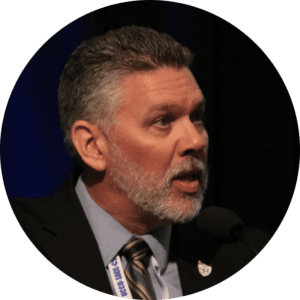
Jason Godin
I was very pleased to be a part CIPSRT from the very beginning on Behalf of federal Correctional officers. I have over the past 28 years been witness too far to many tragedies as a result of many of our members suffering from occupational stress injuries. We have always been the forgotten first responders working behind the walls of Canada’s correctional institutions. I am hopeful & confident that CIPSRT will be able to assist correctional officers with much needed sustainable research & treatment that addresses the specific mental health challenges that Correctional officers are enduring on a far to regular basis.
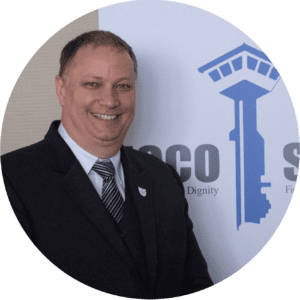
Gord Robertson
For many years the mental health of Correctional Officers, and particularly PTSD and other Occupational Stress Injuries, were ignored and we saw many of our colleagues suffering in silence. It was very important for us that the Government of Canada find initiatives to help with new research and treatment and we believed that CIPSRT was the best avenue to move forward. Through the combined efforts of many, the structure and the funding of CIPSRT was realized and research projects began, training and resilience programs were expanded, and new treatment options are now being created. This work will have a positive impact on all PSP, reduce the stigma around mental health, and will give hope for Correctional Officers that there is a brighter day for their health and future.

Stan Stapleton
USJE recognized that many of our members suffer from Operational Stress Injuries and Post Traumatic Stress Injuries as a result of working with offenders and material related to investigations and offender’s crimes. We produced a report reviewing the Operational Stress Injuries of our members and presented the paper to the Public Safety Parliamentary Committee and Members of Parliament. When USJE was informed of a forum that was looking to advance research and treatment for Public Safety Personal (PSP) we knew that our engagement on behalf of members was critical to assisting not only our members but the many thousands of others that were suffering. We look forward to continuing our engagement with CIPSRT and other agencies to improve the health and life of so many Canadians.
Fire

Sandy Hamamoto
It is a tremendous honour to be one of the founding members of CIPSRT and have the opportunity to work with fellow Public Safety Steering Committee members to help raise awareness, share best practices, and find innovative ways to support public safety personnel who have dedicated their lives to protecting all of us.
The collaborative nature of CIPSRT allows for meaningful engagement between the public safety community and researchers to develop and deliver tools and programs that support the unique needs of our public safety personnel and their families and help reduce the barriers to access mental health resources.

Scott Marks
The IAFF recognized the urgent need to develop research, assistance and treatment for first responders. As the union representing over 90% of Canada’s urban professional fire fighters we saw first-hand that the lack of understanding and resources to assist all first responders was taking a toll on our members, their families and the community at large. The IAFF has proudly supported and participated with CIPSRT in addressing these needs.
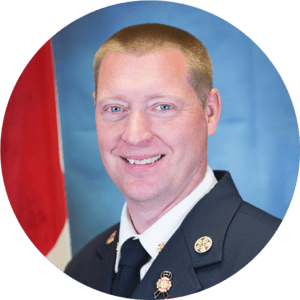
Ken McMullen, BAppB:ES, ECFO, CFEI
The Canadian Association of Fire Chiefs was fortunate to be asked by Public Safety Canada to sit on a steering committee to be formed and supported by the Federal Government to look at the topic of Mental Health of First Responders. As a board member of the CAFC, I was very involved in Mental Health advocacy on behalf of Fire and Emergency Services. Since that first meeting in Regina, I have continued to stay very involved and active with both CIPSRT and other committees pertaining to the support of Mental Health and Wellness of First Responders. As the co-chair of the Public Safety Steering Committee (PSSC) I commit to working with CIPSRT and colleagues to keep this very important issue front and centre. Now more than ever, taking care of those who care for us has never been more important and relevant

Tina Saryeddine
At its Annual General Meeting in 2011, the Canadian Association of Fire Chiefs (CAFC) passed a resolution calling on the federal government to “examine (a) the issue of PTSD and addictions being suffered by Canadian Fire Service personnel and (b) the creation of a Federal Financial Assistance Fund to be available for Fire Service personnel in need of treatment services”. The Canadian Association of Fire Chiefs was pleased to support the creation of CIPSRT as a means to advance these goals. Today it is our hope and expectation that in the short term, we can complete mental health awareness training, ensure we have a crisis prevention line in place and continue to find ways to use the levers of health research to offer access to safe care for those most in need.
Paramedic

Chris Hood
The Paramedic Association of Canada understood the importance of a center of excellence in the research and development of best practices in validation, education and treatment of members of the public safety community. We were proud to be founding members of the development of CIPSRT.
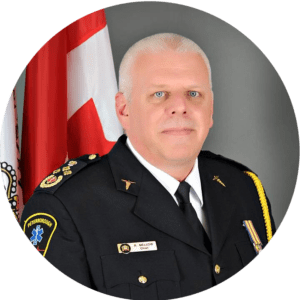
Randy Mellow
Throughout my career and in a public safety leadership role, I have witnessed the effects of operational stress injuries and other mental health concerns on public safety personnel. Those individuals all too often suffer in silence as a result of barriers to seek help such as stigma and the lack of high quality and easily accessible mental health care. The creation of CIPSRT was an innovative and foundational opportunity to bring together both existing and novel research resources and to develop evidence informed strategies and resources to support high quality and accessible mental health care for public safety personal and their families.

Kelly Nash
As a member of the Public Safety Steering Committee (PSSC), created by CIPSRT – I am honoured to have been a part of this organization since its inception. The dedication of the CIPSRT team has created significant resources crucial to maintaining the health and well-being of our Paramedic Community. The entire public safety sector benefits from keeping our personnel safe – so that we can ensure the safety of the citizens we serve.

Pierre Poirier
The mental health of paramedics has suffered for years. There has been a paucity of research in first responder mental health.
Since the inception of the Canadian Institute for Public Safety Research and Treatment, there is optimism in the paramedic community that mental health issues are receiving appropriate attention. Kudos to CIPSRT which has led important research and supported innovative treatment options for paramedics.
Police
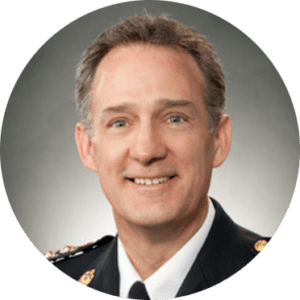
Mark Chatterbok
I am grateful for the opportunity I had to represent the Canadian Association of Chiefs of Police on this unique national initiative to change the way in which public safety personnel’s needs are being met in relation to their overall mental health. Through a collaborative approach between practitioners and researchers, a great foundation has been built to not only raise the awareness of mental health among PSP, but to also provide practical deliverables while continuing to conduct valuable research to enhance knowledge in this area. It is crucial that all public safety personnel can enjoy good mental health throughout their career, and I know that CIPSRT is well positioned and motivated to continue to work toward this important goal.

Gregory Krätzig
Many years ago several of us began discussing how to address the many mental health support and treatment gaps for first responders. During this time we realized that we need to create a national body dedicated to helping first responders. There were many challenges and hurdles to overcome; however, over time through advocating and education the concept of this type of national body made it to the highest level of government who also recognized how first responders and their families would be better supported through a targeted national approach.

Jennifer Malloy
As Executive Director of the Canadian Association of Police Governance (CAPG) for the last 16 years, I am very aware of how critical mental health is for public safety personnel. The CAPG has supported the work of CIPSRT since its inception. There is a duty for our members, as informed employers, to understand mental health issues among police personnel. Engaging as a member of the PSSC allows to keep abreast of leading research on how to have a psychologically healthy workplace for public safety personnel, to build partnerships in mental health with other stakeholders and provide input from the police governance perspective.

Steve Schnitzer
From 2013 to 2020 I chaired the Canadian Association of Chiefs of Police (CACP) Human Resources & Training Committee. A major initiative of the CACP and this Committee was police officer and first responder wellness, with an emphasis on mental wellness. I was asked by the CACP to represent policing at CIPSRT and I am proud of the initial work that was done to survey first responders and advocate for funding so that wellness programs could begin to be developed.
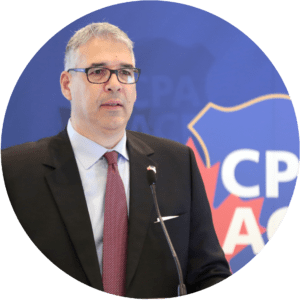
Tom Stamatakis
As President of the Canadian Police Association, representing civilian and sworn front-line law enforcement personnel across Canada, we recognized quickly that there was a pressing need for a coordinated approach towards research into the unique mental health challenges faced by public safety personnel. Our organization was one of the first to push Public Safety Canada to take a leadership role in this sector, and I am immensely proud to have worked with government, academic researchers, and medical professionals to create CIPSRT, and to see it grow into a recognized leader in the sector

Rob Stephanson
I am very humbled to be considered and very pleased to learn that Federal funding has been obtained and that CIPSRT is going to continue to lead the way in improving the ongoing health and well-being of all Public Safety Personal and their families across this country. It was very troubling back in the beginning stages to hear about the growing threat of Occupational Stress Injuries throughout the PSP community and imperative that an organization like CIPSRT was created to provide the research and programming support to address this serious issue. It was an easy decision for myself, on behalf of the Canadian Association of Police Governance, to commit to supporting this invaluable organization (CIPSRT) at its inception!

Casey Ward
CIPSRT is an amazing organization focusing on the mental health of our first responders. CIPSRT continues to use evidence-based research to assist first responders. This research and treatment helps keep first responders healthy so they can continue to serve their community.
Research leadership Team

Greg Anderson
Having a long history of performing PSP research, and lived experience, I have been passionate about a coordinated effort to support current and former public safety personnel, their leaders, and their families to maintain and improve their mental health and well-being. The concept of CIPSRT became that passion – the coordinated effort of a small group of researchers dedicated to a coordinated call to action to support Canadian PSP. I have been honored to be one of the founding members who lobbied for and obtained funding for what was envisioned as a National Research Consortium and Knowledge Exchange Hub, and hope that our efforts continue to support a robust system that supports PSP mental health and wellbeing, and we can make a difference for PSP present and past, their families and leaders.
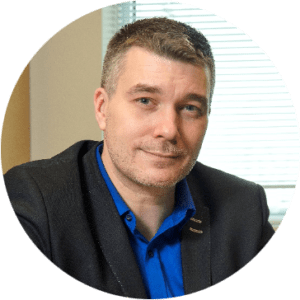
Nick Carleton
I felt incredibly privileged to work with such an extraordinary group of visionaries who have remained steadfastly dedicated to protecting and improving the mental health of Public Safety Personnel. Their unwavering commitment to others was inspirational and made possible successes we have seen to date, and the many that are yet to come. I am honoured that my colleagues in the founding efforts valued my contributions, as I most certainly valued all of their contributions. I am also very excited to see ongoing improvements in supporting the mental health of our frontline Public Safety Personnel.

Heidi Cramm
For me, the idea of CIPSRT presented an opportunity to create a critical network to advance research that matters to public safety personnel, their families, and leaders. In helping to found the Institute, I was able to enact my values around the social mission of research service in ways that were personally and professionally meaningful. In my professional life, I was seeing advances in research that was changing policy and programming for military and veteran families. In my personal life as a firefighter spouse, I could see similar needs for fire families, but a lack of associated research and programming. With the founding of CIPSRT, I had an opportunity to leverage these experiences and knowledge and extend my research program and leadership to help address these inequities.

Stephen Czarnuch
I strongly believe that the efforts of all public safety personnel (PSP) warrant special consideration, particularly because PSP routinely work in conditions that are far more likely to negatively affect them and those around them compared to many other occupations. I have a personal interest in helping public safety communicators, who have only recently begun to receive the recognition for their work in maintaining Canada’s public health and safety, shoulder to shoulder with other PSP. I supported the founding of CIPSRT, and continue to support CIPSRT because I believe that together we are stronger! I believe that all of the great people who make up CIPSRT are working toward a common goal: to serve and protect those who serve and protect us.

Joy MacDermid
I believe that research can improve health, improve the quality and efficiency of services and support better policy decisions. I believe that applied research where stakeholders and researchers work together on real-world problems is important and exciting, as it provides the most direct route to change. I was invited by firefighters to conduct research relevant to their health concerns and think it was my duty to help, given their commitment to help others. Research on the health of public safety (PSP) is a priority and has many inherent challenges and capacity concerns. CIPSRT has brought together the PSP community to focus on greater impact, build research capacity and facilitate the transfer of research findings into better interventions and policies. This aligns with my commitment to help PSP, and I am committed to CIPSRT’s mission.

Renee MacPhee
During the last 25 years that I have been working with paramedics and conducting research within the paramedic community, I have witnessed firsthand the physical and psychological toll that their jobs have taken on them, their families, their peers, and their friends. My decision to join CIPSRT was fueled by the lack of evidence-informed resources to support Canadian paramedics and other public-safety personnel (PSP). In CIPSRT I saw the immense potential for the institute to be a leader and strong advocate with respect to how mental health supports for PSP are designed, delivered, and implemented. In only a few years, with research and national collaborations at its core, CIPSRT has been able to effect positive changes for PSP. I am very proud of our accomplishments to date, and I look forward to the institutes’ continuing efforts to improve mental health for all Canadian PSP.

Rosemary Ricciardelli
In the early days, back in 2016, my support for the founding of CIPSRT very much evolved from a desire to included Correctional Workers in the institute. I believe in supporting the well-being of all public safety personnel, and I wanted to see the inclusivity of CIPSRT extend, at the time, to correctional services and beyond. From that, in being “stronger together”, I’ve continued to seek a space that provides evidence informed knowledge that can best serve those who serve to protect us. CIPSRT has been and will continue to be a highlight of my career, I valued the impact being made in all public safety professions and hope that together we can continue to make a difference.
Executive Team

Ronald D. Camp II
I was offered an opportunity by Steve Palmer to help out in establishing a Canada-wide organization that could change the world for the better one first-responder at a time. How do you say no to a once-in a lifetime opportunity like that?

Lisa Lefebvre
As the inaugural Strategic Communications Advisor for CIPSRT, my role was to provide advice, guidance, and support to CIPSRT by developing and overseeing strategic communication and messaging activities for the Institute. With my 35 years of experience in developing targeted governmental and business communications strategies, I understood the environment in which CIPSRT would evolve and grow. My experience with research bodies such as NRC, DRDC, and the Canadian Police Research Centre provided me with insight on the needs of first responders in Canada. My goal was to facilitate the conversations between researchers and end users to provide decision makers with scientific-based evidence regarding the mental health issues faced by public safety personnel in Canada. I feel that CIPSRT and its partners have provided, and will continue to provide, important tools and guidance to support those who put their own lives at risk to protect ours.

David Malloy
It has been my distinct pleasure to be a founding member of this organization not only as the former Vice President Research at the University of Regina but also as a researcher exploring ‘moral injury’ among PSP. I am so proud to see how CIPSRT has met its mandate to become a global leader in public safety personnel mental health. This institute is having tremendous impact – it is making a difference in the lives of those who commit their careers to our individual and collective safety.

David Miller
In recent years there has been much progress expanding the conversation about mental health and wellness. However access to timely assistance has remained an issue for many. Given the extraordinary experiences of public safety personnel, it was my great pleasure to work with the CIPSRT team to help move their collaborative vision forward.

Steve Palmer
During my career in innovation CIPSRT was one of the few occasions to be part of the collaboration that results when the research excellence, passion, and the energy of academics aligns directly with a pressing social need and equally passionate and committed leadership from the Public Safety community. It is inspiring to see CIPSRT evolve into the success it is today addressing Operational Stress Injuries

Vianne Timmons
As past-president of the University of Regina, I was proud to support and be a founding member of CIPSRT. Public safety personnel dedicate their lives to protect and help us – sometimes giving their lives to do so. The least we can do is work to improve the health and well-being of these dedicated individuals and their families, and ensure mental health supports are in place to help when things when needed.